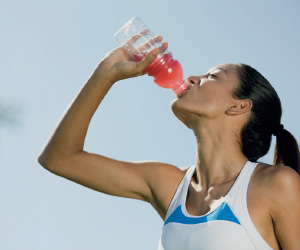Your favourite thirst quencher can add up to more than you bargained for. By Liezel Joubert
 Staying away from slap chips, boerie rolls and trifle isn’t all you should be doing if you want to keep your weight in check. In a fact sheet about the link between sugary drinks and the obesity epidemic in the US, compiled by the Department of Public Health at Harvard University, liquid culprits are shown to play a huge role in health and weight management.
Staying away from slap chips, boerie rolls and trifle isn’t all you should be doing if you want to keep your weight in check. In a fact sheet about the link between sugary drinks and the obesity epidemic in the US, compiled by the Department of Public Health at Harvard University, liquid culprits are shown to play a huge role in health and weight management.
WE’RE LOOKING AT YOU
If you think you’re not one of those people who drink their sugars, you may want to think again. SA dietitian Alex Royal says sugar is concealed in many beverages. ‘The real problem
is that many of us don’t realise that what we drink affects the waistline,’ she says. Drinks are ingested quickly and with little thought, so we end up drinking too much and don’t feel full,
so we consume more food as well as more kilojoules. ‘All of this is a very slippery road to weight gain.’
THE NUMBERS DON’T LIE
Consider this: the average 330 ml can of fizz contains approximately 600 kJ and has between 34 and 50g of sugar. That’s between eight and 13 teaspoons! Mixers such as 200 ml of tonic water, cola or dry lemon have between 280 and 450 kJ and four to six teaspoons of sugar. And don’t forget about fruit juices and iced teas. These seemingly healthier options are bad too: 250 ml packs around 400 to 500 kJ and 30g of sugar (six teaspoons).
Now brace yourself for the real truth about your favourite alcoholic drinks. Many of us are aware that an average 330 ml beer (550 kJ) equates to about two slices of bread, and having a small glass of dry wine (600 kJ) means you could’ve eaten half a bar of chocolate. But did you know that a double brandy and cola or a frozen daiquiri adds up to about 1 000 kJ? That’s a small plate of slap chips, half a large packet of crisps or one cup of ice cream.
EVERYTHING IN MODERATION
Nevertheless, you don’t have to feel as though you can never have a drink again. Just make better choices and keep quantities low.
‘There are two big errors people make when choosing what to drink. Firstly, it’s the type of mix, which is usually full of sugar, and secondly, quantity. Overindulging (more than one unit for females or more than two units for males) and especially binge drinking (more than six units) are linked to increased body fat and chronic disease such as fatty liver,’ explains Alex.
The yay and nay list
Nay
• Sugary fizzy drinks 150–190 kJ per 100 ml
• Fruit juice 200 kJ per 100 ml
• Iced tea 200 kJ per 100 ml
• Milkshakes 125 kJ per 100 ml
• Energy drinks 200 kJ per 100 ml
• Beer 120–225 kJ per 100 ml
• Cider 260 kJ per 100 ml
• Sweet wine 650 kJ per 100 ml
• Cream liqueur 1 350 kJ per 100 ml
• Cocktails 500 kJ per 100 ml
Yay
• Water 0 kJ
• Herbal tea (black, no sugar) close to 0 kJ
• Tea* with milk 30–40 kJ per 100 ml
• Coffee* with milk 15–20 kJ per 100 ml
• Green juices (with leafy veggies) 160 kJ per 100 ml
• White wine spritzers (100 ml wine with soda or sparkling water) 250–350 kJ
• Red or white wine 250–350 kJ per 100 ml
• Light beer 130 kJ per 100 ml
• Light cider 170 kJ for 100 ml
• Spirits (neat) 220–320 kJ per tot
*Limit yourself to four caffeinated drinks per day, lose the sugar and add a small amount of milk.
FAST FACT
Women who drink a can of cooldrink or an energy or sports drink a day run a 75% higher risk of getting gout than those who don’t. Men with similar habits have a 20% higher risk of having a heart attack. And children’s risk of obesity later in life increases by as much as 60%.
JUICY INFO
According to dietitian Alex Royal, juicing offers a large amount of fibre, vitamins and minerals. But if you’re only having juices, you’ll be limiting your intake of protein, certain vitamins from wholegrain starches, and fats. And you’re more than likely consuming too much sugar – one large apple contains about four teaspoons of sugar.
Pros You may lose weight if you limit your overall energy intake, and you can possibly boost your vitamin and mineral intake.
Cons You may suffer from muscle loss (due to lack of protein), energy dips and constipation (due to the starch reduction), calcium and iron deficiency. Also, if you end up losing weight too quickly, the weight loss might not be sustainable.
The verdict If you’re drinking one wholesome juice with not too much fruit in it (you may want to add in some spinach, kale, cucumber or celery to bulk up the volume and keep the sugar and kilojoules lower) as a meal replacement or part of a balanced diet, it can be good for you. But don’t assume that a diet limited to apple, banana, berry, carrot and grape juices
is healthy and will make you lose weight in the long run.
SMOOTH MOVES
Some smoothies are packed with sugar and energy from the fruit, fats in nuts, full-cream yoghurt or peanut butter that are added, so they won’t help with weight loss and could even accelerate weight gain. One 300 ml smoothie can serve up 800–1 200 kJ of energy, depending on where you buy it. Know what goes into your smoothie and if you decide to have one, cut down on other meals or drinks throughout the day. Don’t just mindlessly drink it between meals.







